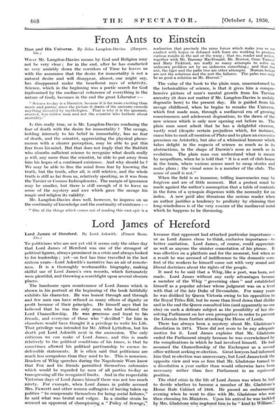From Ants to Einstein
WHAT Mr. Langdon-Davies means by God and Religion may not be very clear ; for in the end, after he has conducted us very amiably down the corridors of Time he leaves us with the assurance that the desire for immortality is not a natural desire and will disappear, almost, one might say, has disappeared under the beneficent rays of relativity. Science, which in the beginning was a poetic search for God (epitomised by the mediaeval coherence of everything in the nature of God), becomes in the end the great Liberator :—
" Science to-day is a liberator, because it is far more exciting than music and poetry, since the picture it draws of the universe exceeds anything invented by mythologies. That is why it is the ignorant, stunted, fear-ridden man and not the scientist who bothers about mortality."
Is this really true, or is Mr. Langdon-Davies confusing the fear of death with the desire for immortality ? The savage, holding intensely to his belief in immortality, has no fear of death, and the scientist, appreciating the physical pheno- menon with a clearer perception, may be able to put this fear from his mind. But that does not imply that the Babbitt who absorbs sufficient science to recognize what death really is will, any more than the scientist, be able to put away from him his hopes of a continued existence. And why should he ? We may be able to free the mind from fear by knowing the truth, but the truth, after all, is still relative, and the whole truth is still as far from us, relatively speaking, as it was from the Tarsier or Cosmos Indieopleustes. The margin of ignorance may be smaller, but there is still enough of it to leave us some of the mystery and awe which gave the savage his magic and religion its validity.
Mr. Langdon-Davies does well, however, to impress on us the continuity of knowledge and the continuity of existence - One of the things which comes out of reading this vast epic is a
realisation that precisely the same forces which make you or me exalted with hopes or debased with fears are working to produce curious results in the ant or the wasp ; that we, reader and writer, together with Mr. Ramsay MacDonald, Mr. Hoover, Gene Tummy and Mary Pickford, are really so many attempts to solve an unknown problem set by an unknown something ; and that the ant, the tiger and the palm tree are other attempts. Human being,' are not the solutions and the rest the failures. The palm tree may be as good a solution as Mr. Hoover."
The value of the book to the plain man, unaccustomed to the technicalities of science, is that it gives him a compre. hensive picture of man's mental growth from his Tarsian ancestry (it does not matter if Mr. Langdon-Davies is unduly dogmatic here) to the present day. He is guided from his savage childhood, when he begins to remake the Universe, which first made man, through a mediaeval era of growing consciousness and adolescent dogmatism, to the dawn of the new science which is only now opening out before us. The plain man must admit that he has a delightful cicerone, vastly read (despite certain prejudices which, for instance, cause him to omit all mention of Plato and to place an excessive premium on Aristotle), but also of a whimsical humour which takes delight in the nugacia of science as much as in its abstractions, in the shape of Darwin's nose as much as in evolution. The plain man can understand what is meant by neopallium, when he is told that "it is a sort of club house in the brain, where various senses meet to swap stories and make plans ; the visual sense is a member of the club. The sense of smell is not."
When the field is so immense, trifling inaccuracies may be forgiven and are of little moment. But a protest must be made against the author's assumption that a table of contents in the form of a synopsis dispenses with the necessity for an index. A new peril also threatens the serious reader when an author justifies a tendency to prolixity by claiming that long-windedness is of the very essence of the mediaeval mind which he happens to be discussing.




















































 Previous page
Previous page